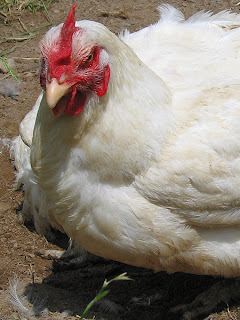Most people imagine that their food is grown on a happy farm. The chickens run freely in their coops and the cows roam the pastures eating grass. Consumers are unaware of how their food is raised. In reality, the chickens are genetically modified, to grow bigger. The extra weight causes the birds’ leg to collapse, or causes heart failure (Figure 1). The cows are force fed corn which is not part of their natural diet resulting in health concerns for the animals (Figure 2). The farming techniques are so unethical that multiple food companies refuse to be interviewed about their product productions.
There are two types of agriculture. The first type is Sustainable Agriculture, which is the increase in food yields without damage to the environment.
Pros | Cons |
· No chemical pesticides, herbicides and insecticides. | · Small Scale Production |
· No growth hormones | · Products are expensive |
· Raise wide range of animal breeds and crop variety. Farmers raise animals and plants adapted to the surrounding environment. | |
· Fair wages and sanitary working environment. |
The second is Industrial Agriculture, a food system of large scale agricultural production with the use of chemical pesticides, etc.
Pros | Cons |
· Large Scale Production | · Use of chemical pesticides, herbicides, and insecticides |
· Products are cheaper | · Use of antibiotics, growth hormones, and genetic engineering |
· Rely on monoculture crop system à few selected breeds are grown. | |
· Unsanitary conditions in the farm houses or slaughterhousesà cause food-borne diseases. |
Sustainable agriculture is more ethical, but industrial agriculture is cheaper. Many companies follow the latter to increase their gross profit. As a result, industrial agriculture is causing the genetic diversity is declining.
Our food supply is based on a small variety of crops, including corn and soy beans. There is controversy involving soy beans. Monsanto, a chemical company, developed a soy bean, called Round Up, that was resistant to a certain pesticide (Figure 3). In 1996, when Monsanto began to sell Round Up, only 2% of soybean in the US contained the patent genes. By 2008, over 90% of the US soybeans contained the genes. Soon all the soy beans will contain the patent gene. The genetic diversity among this crop will decrease and less productive breeds will become extinct. Also, if a disease that destroyed the soy beans with the patent genes were to develop; most of the crops would be destroyed and the food industry would suffer.
Sustainable agriculture is capable of providing for the rapid growth of global human population, if some changes were made. Currently, the food industry is concerned about money; the cost for materials and labour (Figure 4). There are cases of companies using cheap ingredients to keep the food flavourful and/or using illegal immigrants for cheap labour. If the companies take the steps to improve their product manufacturing, such as improving the working environment for their employees, then the unethical industrial agriculture will eventually evolve into moralistic sustainable agriculture while producing the yield needed to serve the population.
Pictures
 |
| Figure 1: Some companies genetically modified the chickens so that they grow bigger and faster. The birds are growing at such a fast rate, that the bones and unable to develop. As a result, many chickens are extremely weak in the legs. Also, many chickens die from heart failures due to the extra weight. |
 |
| Figure 2: The cows are force fed corn which is not a component of their natural diet. Corn is given becuase it is a cheap alternative and helps to fatten the animal. |
 |
| Figure 3: The Roundup Soybeans produced by Monsanto. These soybean seeds are resistent towards a certain pesticide. |
 |
| Figure 4: A comic to demonstrate the wages paid to the labor workers in industrial agriculture. |
Work Cited
"Randomwiktor's DeviantART Gallery." RandomWiktor on DeviantART. Web. 06 Feb. 2011. http://randomwiktor.deviantart.com/gallery/?q=un natural#/dm07op.
"S - Sahel to Systems Theory - Geography Dictionary." ITS Tutorial School (ITS) Hong Kong - English Tutor HK, IELTS Tuition, IB, IGCSE, SAT, GCSE, HKDSE Teacher, UK A Level. Web. 06 Feb. 2011. http://www.tuition.com.hk/geography/s.htm.
"YouTube - Food INC Documentary Movie On Who Is In Control Of Your Food Must See 7 / 10." YouTube - Broadcast Yourself. 30 Dec. 2010. Web. 06 Feb. 2011. http://www.youtube.com/watch?v=HVDuRSkx-30.
Food Inc. Dir. Robert Kenner. Perf. Michael Pollan, Eric Schlosser and Gary Hirshberg. Food Inc. 30 Dec. 2010. Web. 12 Jan. 2010. http://www.youtube.com/watch?v=HVDuRSkx-30.
Melissa. "An Apology to Peas." Mundane Ethnography. 15 Aug. 2010. Web. 06 Feb. 2011. http://www.mundaneethnography.com/.
Blogs Commented On
http://jayy-tan.blogspot.com/2011/01/its-not-farmits-factory.html#comments
http://adorablogs.blogspot.com/2010/11/foods-we-eat-could-kill-tons-of-other.html?showComment=1295970505210#c7383247691071252700
